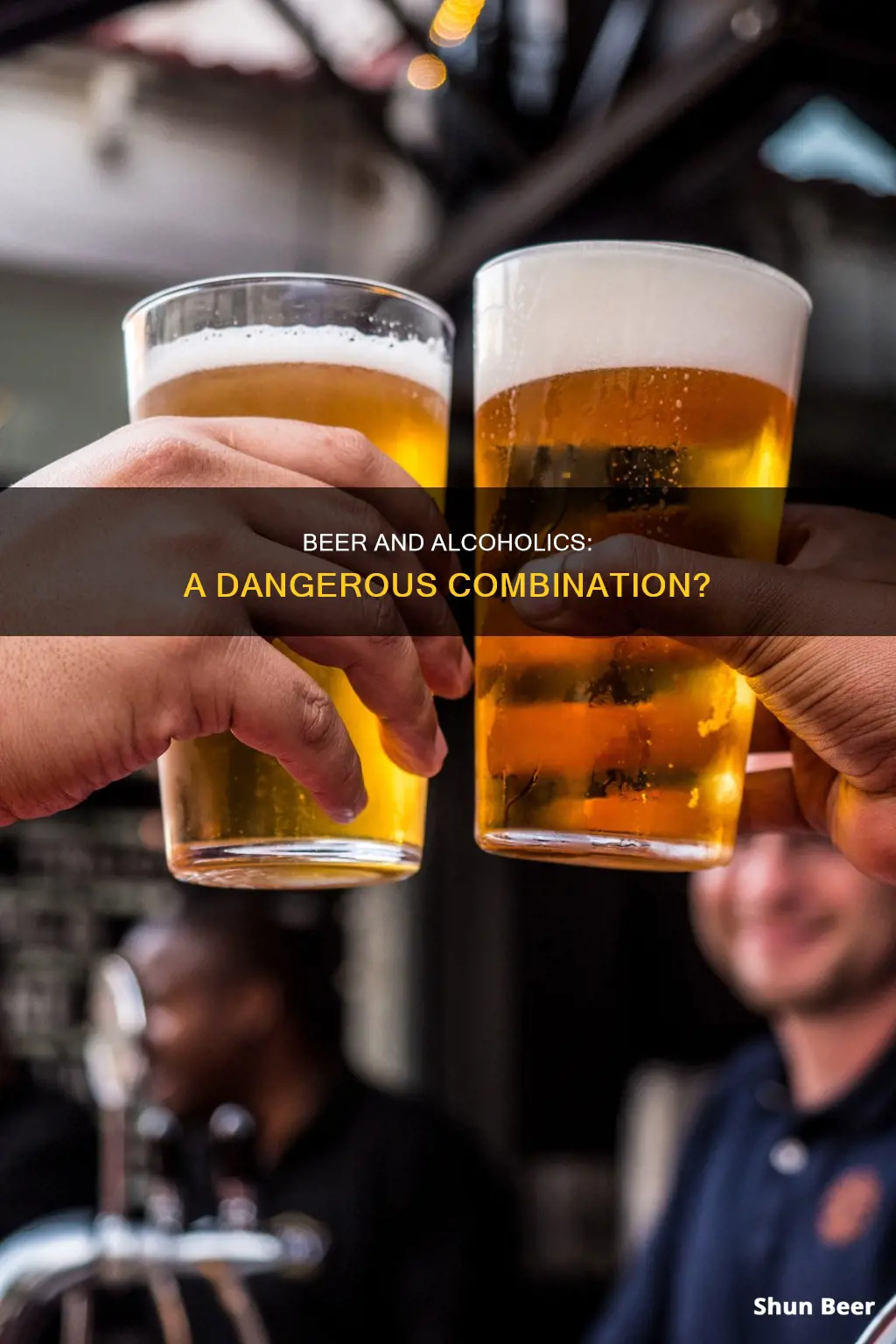
Alcoholism, or alcohol addiction, is a chronic disease characterised by an inability to control or stop drinking despite negative consequences. It often leads to severe physical and mental health issues, impaired daily functioning, and emotional problems. Beer, like other alcoholic drinks, contains ethanol, which is a psychoactive substance capable of causing addiction. While beer contains a lower concentration of alcohol per fluid ounce, it is still considered an alcoholic beverage with the same effects on the brain and body and the risk for abuse and addiction. This risk generally emerges when beer drinking consistently exceeds moderate levels.
There is a common misconception that beer drinking is safer than other forms of alcohol consumption, and that those who only drink beer are less likely to become alcoholics. However, this is a myth that can give people a false sense of security. The question is not what someone drinks, but how they drink. Those who abuse alcohol will develop problems, regardless of their drink of choice.
What You'll Learn

Beer drinking is not safe
Health Risks:
Excessive beer consumption is associated with an increased risk of various health problems, including liver disease, cardiovascular issues, digestive problems, weight gain, and certain types of cancer. Heavy drinking can also lead to the development of mental health disorders such as depression, anxiety, and cognitive impairments. Additionally, it can weaken the immune system, making it more difficult for the body to fight off diseases.
Addiction and Dependence:
Beer contains ethanol, a psychoactive substance that can lead to addiction. Regular and excessive consumption of beer can result in physical dependence, with individuals experiencing withdrawal symptoms such as anxiety, tremors, sweating, nausea, and irritability when they reduce or stop drinking. This can create a cycle where individuals continue drinking to avoid the discomfort of withdrawal.
Impact on Daily Life:
Beer drinking can interfere with daily life and responsibilities. It can lead to job loss, financial strain, and strained relationships with family, friends, and colleagues. Additionally, individuals may lose interest in hobbies, social activities, and other interests, leading to social isolation.
Negative Effects on Mental Health:
Excessive beer consumption is associated with an increased risk of mental health issues such as depression and anxiety. It can also impair cognitive functions and alter moods, leading to irritability and aggression. In some cases, it may even contribute to the development of mental health disorders.
Antibiotics and Alcohol: Safe Mix When Treating Chlamydia?
You may want to see also

Alcoholics can be high-functioning
Alcoholism is a chronic disease characterised by an inability to control or stop drinking despite negative consequences. It often leads to serious health issues, emotional problems, and disruptions in personal and professional life. However, it is important to note that not all alcoholics fit the stereotypical image of a person who is always drunk, unable to hold down a job, or estranged from their family.
Some alcoholics are high-functioning and may perform well in their careers. They can be rich and successful, well-respected in their communities, and may never have had any legal problems as a result of their addiction. High-functioning alcoholics can come from all social classes, backgrounds, races, nationalities, religions, and political affiliations. They may be able to hide the worst of their drinking from family and friends, and they may never become aggressive when drinking. To others, they may seem perfectly charming.
High-functioning alcoholics may be able to avoid drinking until the evenings and may even be able to stop drinking for a day or two. However, they still face the same health risks as other alcoholics, including liver damage, cardiovascular problems, digestive issues, and an increased risk of certain types of cancer. Their mental health may also be affected, with a heightened risk of developing depression, anxiety, and cognitive impairments.
High-functioning alcoholics can benefit from treatment programs that provide help to achieve sobriety. These programs can include medical detoxification, management of cravings and withdrawal symptoms, behavioural therapies, lifestyle changes, and ongoing support to prevent relapse. It is important to note that some people with alcohol use disorder may be able to learn to drink in moderation, but this is not an option for everyone. Abstinence may be the only way to manage their disorder successfully.
Beer on the Chicago Metra: What's the Rule?
You may want to see also

Beer drinkers can be alcoholics
The dangers of beer drinking include the risk of becoming an alcoholic, high calorie content, and the fact that it is a toxin that damages every organ in the body. Beer drinking can also lead to obesity and health problems due to its high calorie content and low nutritional value. Additionally, some people may mistakenly believe that drinking beer is harmless, leading to excessive consumption.
Alcoholism is characterized by an inability to control or stop drinking despite negative consequences. It can lead to serious health issues, emotional problems, and disruptions in personal and professional life. Alcohol abuse and alcoholism can affect all aspects of a person's life, including their emotional stability, finances, career, and relationships.
It is important to note that the number of beers consumed per week is not the sole indicator of alcohol abuse. Instead, it is more about the impact drinking has on an individual's life and their ability to control their drinking habits. However, health organizations like the National Institute on Alcohol Abuse and Alcoholism (NIAAA) offer guidelines to help identify potentially harmful drinking patterns. For example, consuming more than four drinks daily for men or three for women raises the risk of alcohol use disorder.
Beer drinkers can become physically dependent on alcohol, and experience withdrawal symptoms such as anxiety, tremors, sweating, nausea, and irritability when they reduce or stop drinking. Additionally, beer, like other alcoholic beverages, contains ethanol, which is a psychoactive substance that can cause addiction. The risk of becoming addicted to beer varies from person to person and is influenced by genetic, psychological, and social factors.
Some signs that indicate a person may have a drinking problem or alcohol use disorder include:
- Feeling guilty or ashamed about drinking
- Lying about or hiding drinking habits
- Needing to drink to relax or feel better
- "Blacking out" or forgetting what happened while drinking
- Regularly drinking more than intended
- Drinking to cope with difficulties or avoid feeling bad
- Repeatedly neglecting responsibilities due to drinking
- Using alcohol in physically dangerous situations
- Experiencing legal problems due to drinking
- Continuing to drink despite problems in relationships
Beer and Anemia: Is It Safe to Drink?
You may want to see also

Alcohol withdrawal symptoms
It is a common misconception that people who drink beer are less likely to become alcoholics than other types of drinkers. This is a myth that can give people a false sense of security. Beer contains alcohol, and those who abuse it will develop problems. The question is not what people drink but how they drink.
When a person who has been drinking heavily and regularly suddenly stops drinking, they may experience alcohol withdrawal. Alcohol withdrawal symptoms can range from mild to severe and can occur within 8 hours after the last drink, but sometimes days later. The symptoms tend to peak by 24 to 72 hours but may go on for weeks.
Mild symptoms can start as early as 6 hours after the last drink and can include anxiety, nervousness, jumpiness, shakiness, and insomnia. More severe symptoms can start to occur 12-48 hours after the last drink, including hallucinations, seizures, and delirium tremens (DTs). Only about 5% of people with alcohol withdrawal will experience DTs, which can include vivid hallucinations and delusions.
If you are experiencing alcohol withdrawal, it is important to seek medical help, especially if you are experiencing severe symptoms. Treatment for alcohol withdrawal typically includes supportive care, such as limited contact with people, a positive and supportive atmosphere, healthy food, and fluids. In some cases, inpatient care and drug treatment may be necessary.
It is important to note that total and lifelong avoidance of alcohol is the best treatment for those who have gone through alcohol withdrawal.
Beer and Diabetes: What Diabetics Need to Know
You may want to see also

Alcohol tolerance
Development of Alcohol Tolerance
Over time, regular consumption of beer can lead to the development of tolerance. This means that a beer drinker may need to consume larger amounts of beer to achieve the same effects they once felt with smaller quantities. This growing consumption can increase the risk of developing an addiction.
Physiological Factors of Alcohol Tolerance
Direct alcohol tolerance is largely dependent on body size. Large-bodied people will require more alcohol to reach insobriety than lightly built people. The alcohol tolerance is also connected with the activity of alcohol dehydrogenases (a group of enzymes responsible for breaking down alcohol) in the liver and bloodstream.
The tolerance for alcohol is not equally distributed throughout the world's population. Genetics indicate resistance has arisen independently in different cultures. In North America, Native Americans have the highest probability of developing an alcohol use disorder compared to Europeans and Asians. Different alcohol tolerance also exists within Asian groups, such as between the Chinese and Koreans.
Not all differences in tolerance levels can be traced to biochemistry. Differences in tolerance levels are also influenced by socio-economic and cultural differences, including diet, average body weight, and patterns of consumption.
Beer contains many calories, and those who drink excessively can become obese and develop health problems as a result. Beer contains many calories but has relatively low nutritional value. Those who drink beer will usually take longer to become intoxicated than those drinking spirits, meaning they often end up consuming more alcohol over a drinking session.
Beer and Advil: A Safe Mix?
You may want to see also
Frequently asked questions
Yes, beer is an alcoholic drink. It contains ethanol, which is the type of alcohol that causes intoxication and addiction when consumed in excess.
There is no set number of beers per day that indicates alcohol abuse. However, consuming more than 4 drinks daily for men or 3 for women increases the risk of alcohol use disorder.
Drinking beer daily can lead to weight gain, liver damage, an increased risk of heart disease, alcohol dependence, and may worsen mental health issues.
Beer addiction signs include needing more beer over time to achieve the same effects, experiencing withdrawal symptoms when not drinking, a strong urge to drink that is difficult to control, and continuing to drink despite negative consequences.
While some people with alcohol use disorder may be able to learn to drink in moderation, abstinence is often the only option. People with alcohol use disorder may experience withdrawal symptoms, forget the negative consequences of drinking, and be unable to predict or control their alcohol consumption once they start drinking.







